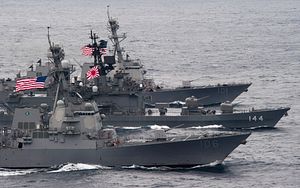China will remain on “high alert for intervention by Japan in the South China Sea issue” Foreign Ministry spokesperson Hong Lei told Xinhua today, urging Japan to reflect on its past aggression during the Second World War.
The Chinese statement was issued in response to Japanese Prime Minister Shinzo Abe’s remarks to U.S. President Barack Obama during a bilateral meeting at this year’s Asia-Pacific Economic Cooperation summit in Manila that Japan would consider sending the Japanese Maritime Self-Defense Force (JMSDF) on patrols in the South China Sea.
“China firmly safeguards navigation freedom of various countries in the South China Sea in accordance with international laws,” Foreign Ministry spokesperson Hong Lei said. “In the meantime, China is strongly against any country using the excuse of navigation and overflight freedom to engage in activities threatening the sovereignty and security of other nations, and facilitating regional militarization.”
On Thursday, Japanese Prime Minister Shinzo Abe said that “with regard to activity by the Self-Defense Forces in the South China Sea, I will consider it while focusing on what effect the situation has on Japan’s security.”
Shinzo Abe’s comments were later that day confirmed by the Japanese Foreign Ministry, although Chief Cabinet Secretary Yoshihide Suga, the Japanese government’s top spokesperson, cautioned:
We have no plans for our Self-Defense Forces to take part in U.S. freedom of navigation operations and at this time the SDF is not conducting continuous patrols in the South China Sea, nor do we have concrete plans to do so.
In June, Admiral Katsutoshi Kawano, chief of the Joint Staff of the Japan Self-Defense Forces, said that he was concerned over China’s recent constructions of artificial islands in the South China Sea (See: “Japan’s Top Military Officer: Joint US-Japanese Patrols in South China Sea a Possibility”).
He emphasized that China’s activities have created “very serious potential concerns” for Japan. Yet, like Suga, he reiterated that as of now there are no concrete plans for JMSDF to regularly patrol the 3,500,000 square kilometers (1,400,000 square miles) of the South China Sea:
Of course, the area is of the utmost importance for Japanese security. We don’t have any plans to conduct surveillance in the South China Sea currently but depending on the situation, I think there is a chance we could consider doing so. (…)
In the case of China, as we can see with the South China Sea problem, they are rapidly expanding their naval presence and their defense spending is still growing. Also because there is a lack of transparency, we are very concerned about China’s actions.
For one thing, there is the question of capacity within the JMSDF and whether it could keep up a regular patrol schedule given the current size of the Japanese Navy. Most recently in October, the JMSDF and the U.S. Navy held a joint naval exercise in the South China Sea that involved the JS Fuyuzuki, an Akizuki-class destroyer and the USS Theodore Roosevelt, a Nimitz-class super-carrier.
Yuichi Hosoya, a professor of international politics at Keio University recently told my colleague Shannon Tiezzi that the Japanese public would only support military operations abroad if there are direct implications for Japan’s survival (See: “Why Japan Won’t Get Too Involved in the South China Sea”). However, the people “do not think that the issues in the South China Sea have a strong link to Japanese national survival (…) I don’t think that the Japanese government and Japanese people are serious about what’s happening in the South China Sea.”
































